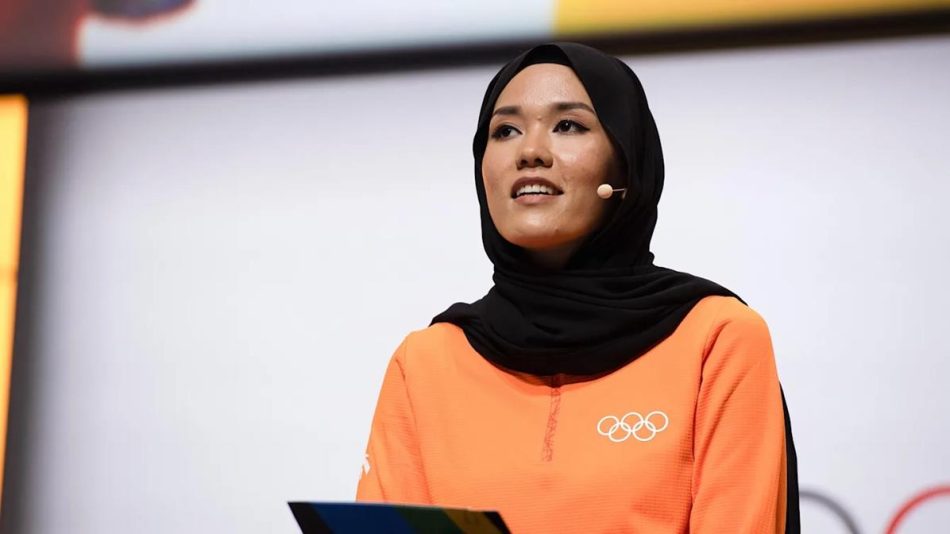Masomah Ali Zada named Chef de Mission for the Refugee Olympic Team Paris 2024

Masomah Ali Zada, who competed in road cycling as a member of the Refugee Olympic Team Tokyo 2020 and is a member of the Athletes’ Commission of the International Olympic Committee (IOC), has been named as the Chef de Mission for the Refugee Olympic Team Paris 2024. She is joined by Bernadette Castel-Hollingsworth, Deputy Director of the Division of International Protection at UNHCR, the UN Refugee Agency, as Deputy Chef de Mission. This follows a decision by the IOC Executive Board (EB).
IOC President Thomas Bach said: “I am delighted to welcome Masomah into her role as Chef de Mission. Having seen her journey from when she left Afghanistan through to competing at the Olympic Games Tokyo 2020, and now becoming the leader of the Refugee Olympic Team, I cannot think of anyone better to represent this team and the more-than 110 million displaced people around the world. Much like all the other athletes on this team, she shows us what refugees and displaced people can and do achieve and contribute to society, and I look forward to seeing her lead by example.”
He added: “We also welcome Bernadette into her role as Deputy Chef de Mission. The IOC has a close collaboration with UNHCR, without which the Refugee Olympic Team would not be possible. This appointment is a demonstration of that friendship. Bernadette brings years of humanitarian experience to ensure that all the athletes on the team receive the necessary support and protection that their precarious status demands.”
Ali Zada was born in Afghanistan into a conservative community where girls were not encouraged to ride bikes. She became the target of threats when she and a group of women started racing competitively. Despite the many barriers she faced, she persevered and ultimately competed as a member of the Afghan women’s national cycling team. She became a refugee in 2017 and claimed asylum in France. Soon after, she received an IOC Refugee Athlete Scholarship, which was another step towards achieving her dream of competing at the Olympic Games.
She is currently studying civil engineering at the University of Lille. She was appointed to the IOC Athletes’ Commission in July 2022.
On learning of her appointment, Ali Zada said: “For me it is a source of pride to be able to represent not only the athletes and the team, but also the more-than 100 million displaced people around the world. In Paris, we have an opportunity to show the world what refugees are really capable of, and redefine the way the world sees us.”
She follows on from Tegla Laroupe, who served as Chef de Mission for the first-ever Refugee Olympic Team in Rio 2016 and the Refugee Olympic Team Tokyo 2020.
As Chef de Mission, Ali Zada will serve as the figurehead and spokesperson for the Refugee Olympic Team, ensuring that the best interests of all the Team members are met, and that the platform provided by the Olympic Games serves to demonstrate the role sport can play in creating inclusive societies, and the enrichment that refugees can be to our communities.
Castel-Hollingsworth joins the Refugee Olympic Team Paris 2024 as Deputy Chef de Mission. She brings more than 20 years’ experience in humanitarian contexts working with displaced people. Most recently she served as Senior Protection Coordinator in Cox’s Bazar, Bangladesh, after which she was deployed on emergency support missions to Burkina Faso and Cameroon.
Castel-Hollingsworth said: “ I have witnessed first-hand the benefits that sport and play can deliver to forcibly displaced and stateless communities, providing a sense of belonging and opportunities, and bringing positive psychological, physical and many other protective benefits. It is great honour for me to support the Refugee Olympic Team and see the positive role that elite sport can play for refugees. I very much look forward to the Olympic Games Paris 2024.”
From the Team to wider support for displaced people
At the United Nations (UN) General Assembly in October 2015, confronted with the global refugee crisis that has seen millions of people in the world displaced, IOC President Thomas Bach announced the creation of the Refugee Olympic Team – the first of its kind – to take part in the Olympic Games Rio 2016.
The Rio 2016 team consisted of 10 athletes, who sent a powerful message of hope to the world through their journeys to the Games and their performances in Rio. A further 29 athletes competed as part of the IOC Refugee Olympic Team at Tokyo 2020.
There are currently 62 athletes benefitting from a Refugee Athlete Scholarship, training and competing in the hope of being selected for the Refugee Olympic Team Paris 2024. They are from 11 countries, live in 19 host countries and represent 13 sports.
Supporting refugees and displaced populations remains a key priority for the IOC, and is part of Recommendation 11 of Olympic Agenda 2020+5. The Olympic Refuge Foundation (ORF) was established in 2017 to build on this commitment, and work towards building a movement which ensures that young people affected by displacement thrive through safe sport. The Foundation functions in lieu of a traditional National Olympic Committee, managing the Refugee Athlete Scholarship-holders and the IOC Refugee Olympic Team for Paris 2024.





